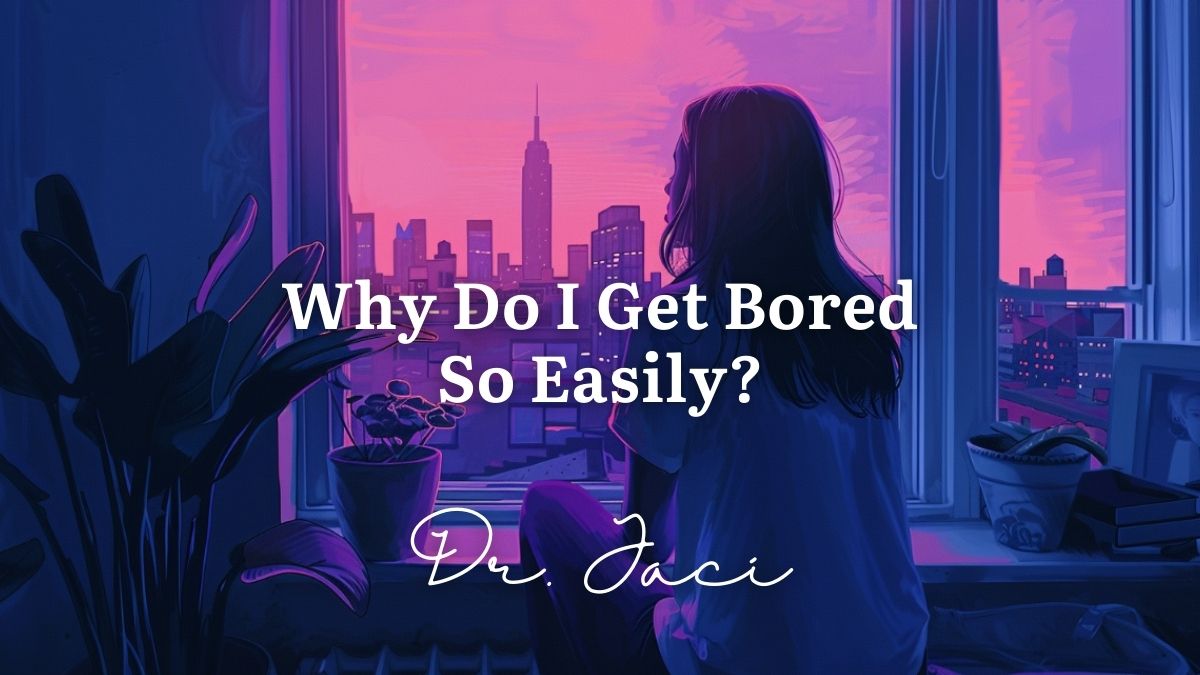If you ever wonder to yourself, “Why do I get bored so easily?” remember that feeling bored from time to time is very common.
However, some people seem to get bored more frequently and intensely than others.
As a clinical psychologist, I have worked with many clients who struggle with excessive boredom in their daily lives.
In this post, I will explore some of the potential reasons why certain individuals are predisposed to boredom and how to find relief.
Boredom and Optimal Stimulation Levels
Research shows that people have varying “optimal stimulation levels” – the amount of environmental stimulation that makes them most comfortable and engaged.
Those with lower optimal stimulation levels may have brains that are “hungry” for stimulation and thus get bored more easily in mundane situations.
Genetics, childhood experiences, and other factors likely shape these thresholds over time.
For example, some clients will often feel distracted and restless within 10-15 minutes of a routine work meeting.
On the other hand, I have other clients who can focus deeply on the same work project for over 4 hours without boredom.
Their brains simply function differently in this regard.
Brain’s Reward System and Dopamine
On a biological level, boredom is connected to the brain’s reward and dopamine systems, which drive us to seek out pleasurable stimulation.
When understimulated, these networks generate an uncomfortable feeling that propels the search for interesting inputs.
People prone to boredom may have imbalances in key neurotransmitters like dopamine.
Alternatively, they may have less dense dopamine networks, which predisposes rapid drops in motivation or enjoyment as an activity becomes tedious over time.
Genetic variability likely also plays a role.
Boredom Psychology

On a psychosocial level, tendencies like anxiety, depression, attention deficits, substance abuse, and avoidant personality traits can also make someone more susceptible to frequent boredom.
For example, those struggling with depression often experience joylessness and a lack of engagement in formerly pleasurable activities. Feeling unmotivated to pursue hobbies or social connections further limits environmental stimulation.
Similarly, people with underlying anxiety may avoid taking risks, pursuing challenges, or leaving their comfort zones, which can lead to monotonous routines. Substance abuse can also serve as an unhealthy escape from bored states in the short term at the cost of worsening future engagement capacity.
Therapy and Boredom
In therapy sessions, we explore how these issues may interact and exacerbate one another over time. Are substances diminishing natural motivation? Is depression fueled by isolation from avoiding new activities out of anxiety? Tailored treatment plans aim to address the root sources fueling boredom proneness.
Creating healthy daily routines, finding purposeful hobbies aligned with one’s interests, and addressing underlying mental health concerns can all help buffer against troublesome boredom through increased lifestyle balance.
Cognitive-behavioral therapy techniques also allow clients to alter counterproductive thought patterns – like rigid beliefs that fun activities are pointless or that avoiding risk is the only way to stay safe. Adaptive thinking patterns help reengage with rewarding challenges.
With compassionate self-insight, motivation naturally returns as people understand their personal barriers and how to healthfully adapt activities or thought processes to overcome boredom’s grip.
Impacts on Relationships
Excessive boredom can significantly impact one’s personal relationships.
Constantly seeking out new thrills or stimulation can lead to risky behaviors like infidelity, gambling issues, or excessive shopping.
These maladaptive coping mechanisms provide distraction and short-term pleasure at the cost of increasing instability, risk, and relational harm over time.
Alternatively, withdrawing from social connections in favor of isolation can also strain family ties over time.
Depressive boredom fuels disinterest in maintaining friendships and romantic partnerships, leading to neglect and eventual loss of support systems. At its most extreme, profound apathy can result in near-total detachment from any external emotional bonds.
In therapy, I help clients foster self-awareness of how their boredom tendencies influence their decision-making so they can start catching and preventing self-sabotaging interpersonal patterns.
By examining our relationship histories, we can uncover the specific ways boredom drives counterproductive relationship or intimacy behaviors.
For instance, limiting time spent in situations that reliably lead to harmful sexual decisions when struggling with boredom and lust. Or scheduling mandatory weekly social dates to combat isolationist urges even when motivation feels low.
When Boredom Becomes Problematic
Most people experience boredom temporarily from time to time.
However, if the intensity or frequency of boredom in your life seems disproportionate or unrelenting, it may have crossed the threshold into a legitimate mental health concern.
Signs that boredom has become excessive or disruptive include:
- An inability to maintain focus at school or work for extended periods of time
- Frequently quitting hobbies or activities soon after beginning them
- Dramatic shifts in mood associated with bored states
- Self-medication with substances
Left unaddressed for too long, severe boredom can contribute to long-term work instability, interpersonal strain, and reduced overall well-being or life satisfaction.
The good news is that targeted treatment plans can help dramatically.
Actionable Tools to Overcome Boredom
If you identify as someone who struggles with excessive or disruptive boredom, there are practical steps you can take to cultivate motivation and engagement.
Build Routines: Establishing consistent daily routines, like journaling, with productive activities woven throughout the day provides structure and prevents large swaths of unfilled time where boredom can creep in. Mix necessary tasks with enjoyable hobbies for balance.
Tap Into Flow States: When you find activities that hit that sweet spot between boredom and anxiety/overstimulation, you enter highly rewarding “flow” states. These absorptive states are key for fulfillment. Experiment to discover the tasks, hobbies, etc., that most easily transport you.
Set Goals: Working towards small, measurable goals and celebrating progress along the way stimulates key motivation and learning centers in the brain. Choose intrinsic goals aligned with your interests for maximum stickiness and reward.
Address Mental Health Issues: As referenced earlier, conditions like depression, anxiety, and ADHD can significantly contribute to boredom. Seeking treatment through therapy, medication, or other modalities can lift some of the clouds and bring back motivation.
Limit Digital Distraction: While digital devices offer endless stimulation at our fingertips, research shows overuse can shrink attention spans and drain enjoyment of slower-paced tasks. Set boundaries on screen time and activities requiring deeper focus.
The key is tailoring interventions to match how boredom manifests and interferes with your well-being. With custom planning and commitment, rewiring chronic boredom is absolutely possible – even exciting!
My office provides individualized assistance and support for this journey.
FAQ
What causes some people to get bored more easily than others?
Lower optimal stimulation levels and differences in brain chemistry, such as dopamine levels, can make some individuals more prone to boredom.
Can boredom be linked to mental health issues?
Yes, boredom is often linked to mental health issues like anxiety, depression, and ADHD.
How can therapy help with boredom?
Therapy can address underlying mental health conditions and change maladaptive thought patterns contributing to boredom.
What impact does excessive boredom have on relationships?
Excessive boredom can lead to risky behaviors and withdrawal, negatively affecting personal relationships.
When does boredom become a problem?
Boredom is problematic when it disrupts daily life, such as causing inability to focus, frequent quitting of activities, or reliance on substances.
What are some actionable steps to overcome boredom?
Building routines, finding flow states, setting personal goals, addressing mental health issues, and limiting digital distractions can help overcome boredom.

